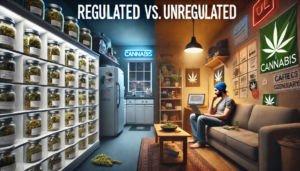Recently, Germany rejected marijuana legalization, proposed in the “German Cannabis Control Bill” by the initiative of the German Green Party. The bill proposed the removal of cannabis from the list of Scheduled drugs on its Narcotics Act (the Betäubungsmittelgesetz or BtMG), and to regulate cannabis in a similar way to alcohol, with adults from 18 years old permitted to buy and possess up to 30 grams from regulated stores.
The rejection of marijuana legalization in Germany came despite the fact that a majority of the members of the Bundestag belongs to a political party that favors some type of reform.
RELATED POST: South Dakota Law Officers Sue to Overturn Cannabis Legalization
Why was it denied
Marijuana Business Daily reports that Legalization efforts during this legislative period are extremely unlikely because:
- German Chancellor Angela Merkel’s center-right, Christian-democratic political alliance – the Union – opposes any liberalization.
- The Social Democratic Party (SPD) is in favor of some reform – at least allowing experimental pilot programs – but cannabis reform has taken a back seat among Social Democrats who prefer to vote in tandem with their government coalition partner, the Union.
- Without favorable votes from at least some members of the government coalition parties – which have a majority in parliament – no legalization scenario is possible.
- Although most opposition parties are in favor of some type of legalization, they remain in the opposition and can’t agree on how that should be accomplished.
The country rejected marijuana legalization mainly because of the coalition formed with the joining of The Union (CDU/CSU) and the Social Democratic Party.
So, even though members of the Social Democratic Party were in favor of introducing marijuana policy reforms, they preferred to vote against it after receiving criticism from their coalition partners.
It’s important to mention that, as of February 2020, members of the Social Democratic Party commented that they “(…) see the regulated distribution of cannabis to adults in Germany as a good chance for a successful policy, ideally supported by simultaneous strengthening prevention and early intervention as well as counseling and treatment”. However, Daniela Ludwig, a member of the Christian Social Union (CSU), was particularly critical about this stance, expressing her condemnation via Twitter, and establishing that “prevention” was the only approach to deal with the bill legalizing recreational marijuana.
Currently, six main political parties constitute the German parliament or Bundestag. Below you will find about their stance on this particular topic:
The Left
This party constitutes 69 seats out of the 709 of the Bundestag. This party was in favor of the legalization initiative.
Social Democratic Party (SPD)
One of the most popular parties in Germany, constituting 152 seats of the Bundestag. Despite the substantial support for the initiative, the party voted in tandem with its coalition partner.
The Greens
This party holds 67 seats of the Bundestag. They were the second party that supported the legalization of the bill.
The Union – Christian Democratic Union of Germany + Christian Social Union in Bavaria
The Union is a coalition between the CDU and CSU parties. They form a majority in the Bundestag with 246 seats currently, making it next to impossible for any initiative to pass unless votes are cast from members of coalition parties. This party is against the legalization initiative.
Free Democratic Party (FDP)
This party holds 80 seats of the Bundestag. They abstained from voting on this particular subject even though, in the past, they had proposed several cannabis reforms.
Alternative for Germany (AFD)
A fairly new party was represented for the first time in the parliament in 2017. They hold 88 seats on the Bundestag. When the proposal of the bill was put forth, it was the only opposition party that was against the bill.
What’s Next
Germany is one of the biggest cannabis markets in the European Union, although nowadays it’s all a medicinal market. With over 4 million Germans using the drug, it’s safe to assume that people in Germany may not be on board with this decision, which could lead to new measures arising in the future.
However, it seems like there’s little chance of recreational marijuana reform being passed during the current legislative period. In this sense, the real question is what could happen after the next federal elections, which is expected about one year from now.
Even though it is still too early to predict results, one signal is positive for adult-use cannabis reform. Current polls indicate the Green Party is rising in popularity at the expense of the SPD. And although both the SPD and the Green Party favor marijuana reform, recreational cannabis reform seems to have a higher priority for the Greens.




